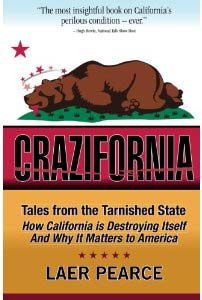Crazifornia: Franchise Tax Board kills the Golden State Goose
by CalWatchdog Staff | January 22, 2013 8:45 am
 [1]Jan. 22, 2013
[1]Jan. 22, 2013
By Laer Pearce
California’s hostility towards business, and willingness to tax it into oblivion, is storied. As State Senator Ted Gaines, R-Roseville, is quoted in my recent book, “Crazifornia[2]“:
“I am tired of my constituents and other business owners here being treated like pinatas by regulators and politicians who smack them around until some fine or penalty falls out.”
Or, for that matter, some newly created tax liability — like the new retroactive (to 2008) tax that’s going to smack the Golden State’s golden goose upside the head. Henry Blodget explains in Business Insider[3]:
“As a way of encouraging entrepreneurs and investors to start companies in California, the state has long offered a tax deduction for those who start, invest in, and eventually sell companies.
“This tax deduction allowed entrepreneurs and [investor] angels[4] to exclude 50 percent of any gain on the sale of ‘Qualified Small Business’ (QSB) stock.
“California’s capital gains taxes are a high 9 percent, so the deduction reduced the capital gains rate to 4.5 percent. This encouraged the entrepreneurs to start and keep their companies in California, instead of decamping to lower-tax states.
“And, for many years, California entrepreneurs and investors have taken advantage of the deduction.
“But now the state has apparently decided that it no longer needs to encourage entrepreneurs to start and keep their companies in California.
“So it is eliminating the tax deduction.
“Far more startling, the state is eliminating the deduction retroactively–going all the back to 2008.” (Emphasis in original)
As you can imagine, those QSBs, the companies that qualified for the reduction in taxes but now suddenly don’t qualify, are not reacting positively to this news.
Retroactive taxes
Retroactive tax increases — a recent passion of our revenue-hungry governor and his Democrat allies in the legislature — should be unconstitutional. They’re certainly unconscionable. Business people make decisions based in part on tax implications, and to change those implications after the fact is akin to double jeopardy and an apparent violation of the ban on ex post facto laws in the U.S. Constitution[5]. An affected party would have to go back in time to protest the change, which of course had not yet been changed.
It’s taxation without representation stuck in a time loop.
The impacts of this criminal behavior by the state will be swift and profound. For starters, a lot of entrepreneurs who sold their businesses after 2008 are going to be very, very angry at the state, and will become much more likely to leave the state. Worse, hundreds or thousands of other entrepreneurs who plan to sell their companies will relocate to states with less onerous tax policies.
Like Proposition 30[6], which increased income taxes retroactively after voters passed it last November, the net effect will be not more money for the state, but less — as we soon will find out. Will Sacramento ever learn that bullying the successful has consequences?
Playground politics
In an article in Xconomy[7], California entrepreneur Brian Overstreet explains how this crazy situation came to be.
It concerns a business that a few years ago had taken the tax advantages due it as a Qualified Small Business. The Franchise Tax Board, the state tax collector, told the company that it was in fact not qualified for the deduction, and would have to pay the higher 9 percent capital gains tax. The FTB had determined that the company failed to meet one of the qualification points — having 80 percent of its workforce and assets in California.
The company sued and won, with the court ruling that the FTB’s action was an unconstitutional violation of the Commerce Clause. Overstreet picks up the story from there:
“Since the FTB lost the case, you might think that they would strike the unconstitutional requirement and keep the rest of QSB statute intact. Not a chance.
“What the FTB did instead was to take their ball and go home. They decided that since they could not impose the ’80 percent requirement,’ no one would be entitled to the QSB exclusion. They put out an announcement terminating the Qualified Small Business exclusion and retroactively disqualifying all exclusions and deferrals going all the way back to 2008.”
True to form, California is alone in its stupidity. The federal government, tone deaf as it is on the economy, realized that encouraging fast-growing businesses is a good thing and extended its QSB program.
Who could disagree with Overstreet when he concludes: “Why in the world would any smart business person start or invest in a new California company facing that kind of penalty?”
Laer Pearce, a 30-year veteran of California public affairs, is the author of “Crazifornia: Tales from the Tarnished State.“
- [Image]: http://www.calwatchdog.com/2012/10/02/its-a-tragedy-its-a-comedy-its-crazifornia/crazifornia-book-cover/
- Crazifornia: http://www.amazon.com/Crazifornia-Tarnished-California-Destroying-Matters/dp/1478357339/ref=sr_1_1?ie=UTF8&qid=1358870794&sr=8-1&keywords=crazifornia
- Business Insider: http://www.businessinsider.com/california-entrepreneurs-retroactive-tax-2013-1#ixzz2IMNbXY00
- [investor] angels: http://en.wikipedia.org/wiki/Angel_investor
- ban on ex post facto laws in the U.S. Constitution: http://en.wikipedia.org/wiki/Ex_post_facto_law#United_States
- Proposition 30: http://ballotpedia.org/wiki/index.php/California_Proposition_30,_Sales_and_Income_Tax_Increase_(2012)
- an article in Xconomy: http://www.xconomy.com/san-francisco/2013/01/15/california-to-hit-startup-founders-with-big-retroactive-tax-bills/
Source URL: https://calwatchdog.com/2013/01/22/crazifornia-franchise-tax-board-kills-the-golden-state-goose/